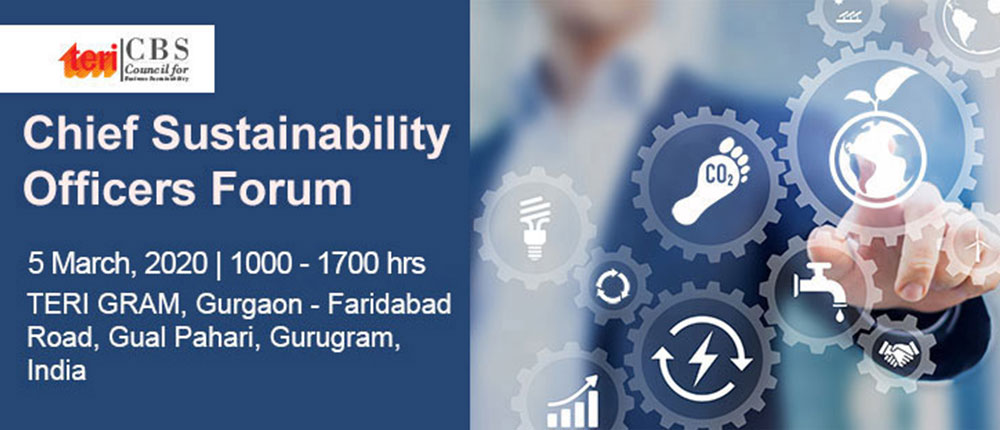Chief Sustainability Officers Forum
The 7th edition of the Chief Sustainability Officers' (CSO) Forum held on 5th March 2020 at TERI Gram in Gurugram, Haryana delved into the emerging trends and global developments in sustainability and how they are shaping sustainability strategies of businesses the world over. The day-long programme comprised of a mix of sessions providing insights on the emerging challenges and opportunities in the context of energy transition and decarbonisation roadmap for the companies. It also looked into how aligning Sustainable Development Goals (SDGs) with core business objectives can be a robust strategy for reaping maximum benefits. The sessions delved into some of the tools, practices, methodologies and platforms for increasing renewable energy mix by leveraging the rooftops of C&I sector.
The Forum was attended by CSOs and senior sustainability executives from companies representing diverse industry sectors. Dr Ajay Mathur (Director General, The Energy and Resources Institute and Co-Chair, Energy Transition Commission) began the proceedings by highlighting the Business Case for Energy Transitions in Indian Industries.
The Forum discussed two contemporary topics that are gaining importance in the sustainability domain:
- Integrating SDGs to strengthen sustainability strategies and actions
- Leveraging the rooftops of C&I sector to increase renewable energy mix
Session 1: Integrating SDGs to strengthen sustainability strategies and actions
By adopting the 2030 Agenda for Sustainable Development, the global community has agreed to take action to end poverty and hunger, boost access to health, education and jobs, while protecting the planet from environmental degradation. Through the 17 SDGs, the 2030 Agenda provides a blueprint for creating a healthy, equitable and peaceful world for all.
Corporates have played a key role in developing the SDGs, indicating their strong inclination to advance the goal of sustainable development for all. The 2030 Agenda itself stresses on the significant role of the private sector and calls for business engagement. Pledging their support, several corporates are aligning their business processes to the SDGs; while some others are evaluating the relevance of SDGs in the context of their business. In India too, an increasing number of companies are aligning and mapping their activities to the SDGs.
Recognising the significant role businesses can play in achieving the SDGs, in March 2019, the Union Ministry of Corporate Affairs (MCA), Government of India released the National Guidelines on Responsible Business Conduct, 2018 (NGRBC) - a revised version of the National Voluntary Guidelines on Social, Environmental and Economic Responsibilities of Business, 2011 (NVGs). In parallel, efforts are underway for developing the next version of SEBI's Business Responsibility Reporting (BRR) Framework i.e. BRR 2.0, in alignment with the NGRBC, 2018. At present, as per SEBI guidelines, the top 500 companies in India are required to report on their non-financial disclosures through the 2011 NVGs-based BRR framework.
In this background, the first session of the day was moderated by Souvik Bhattacharjya (Associate Director - Integrated Policy, TERI). Interjected by lead presentations by Shankar Venkateswaran (Member – Drafting Committee, NGRBC and Consultant, TERI CBS), Dr Shailja Sharma (ADG, SSD, Ministry of Statistics and Programme Implementation, Government of India), the participating sustainability officers deliberated on how operationalising the SDGs can lead to development of innovative business models and building inclusive markets; and the means and opportunities for businesses, government and civil society to work together towards achieving the SDGs.
Dr Sharma highlighted the challenges and future outlook in strengthening the NIF. She also emphasised the importance of sustained partnerships between corporate sector, community, and other stakeholders, including enhanced use of technology. Dr Mritunjay Chaubey (UPL Ltd) and Gagandeep K Bhullar (SuperHuman Race Pvt Ltd) demonstrated the alignment of SDGs in manufacturing operations and data management through smart applications.
Session 2: Leveraging the rooftops of C&I sector to increase renewable energy mix
The year 2020 might be the tipping point for climate change efforts globally. On one hand, it marks a decade of action towards the realisation of SDGs by 2030 and on the other - the ratchet mechanism of the Paris Agreement foresees strengthening of NDCs every five years. The Government of India has set the target of installing 175 GW of renewable energy capacity by 2022. Out of this, 40 GW of grid-connected solar power capacity is targeted to come through rooftop solar power installations. A harmonious confluence of state and corporate actions is imperative to plan, execute and achieve the stated climate goals.
As per the MNRE (2018), India ranks fifth in terms of installed solar capacity globally. Solar power installed capacity has grown significantly from a mere 2.6 GW in 2013-14 to 34 GW as on Januarty 2020. In India, the commercial and industrial (C&I) segments dominate rooftop solar with a share of 70% and there is a dire need for rationalising of issues related to Open Access, Net Metering and Renewable Purchase Obligations (RPOs). The purpose of this session is to provide a platform for dialogue amongst Discoms, Independent Power Producers, and Corporates on issues of common interest and knowledge exchange.
This session was moderated by Dr Ashvini Kumar (Senior Director, Renewable Energy, TERI). The participating Sustainability Officers deliberated on the current policy landscape and identifying the imminent gaps in order to shape impactful policy decisions happenings; and tools and methodologies for identifying clean energy projects, mitigating risks and value addition. Chandra M. Verma (PTC Energy Ltd), Nitin Aggarwal (Signify Innovations India Ltd), Dr Ishan Purohit (IFC), and Gautam Das (Oorjan Cleantech Pvt Ltd) shared their insights on the trends, key considerations and barriers from the policy, finance and operations. The participants also discussed emerging opportunities in the renewables domain, and the growing importance of multi-stakeholder collaboration to drive the sustainability agenda.


